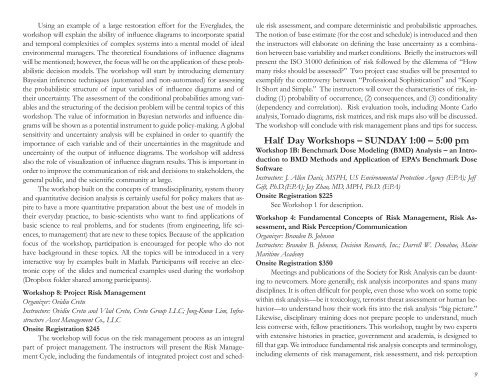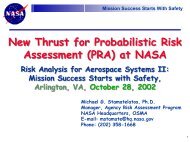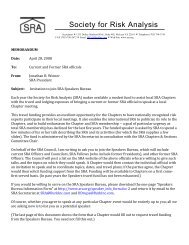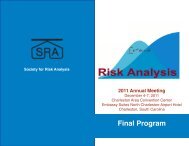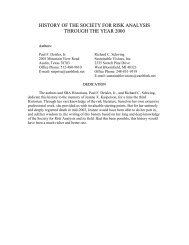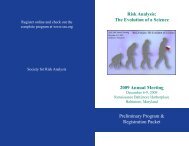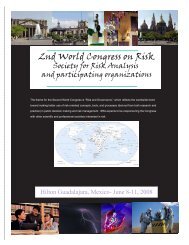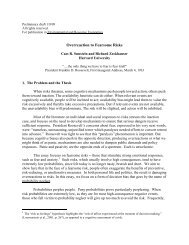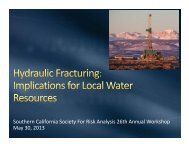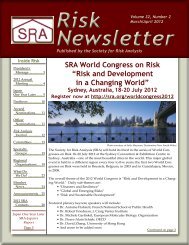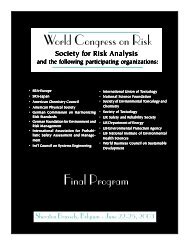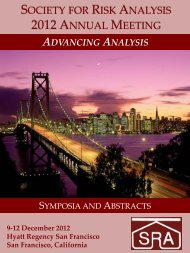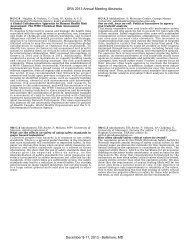Risk Analysis: Advancing Analysis - The Society for Risk Analysis
Risk Analysis: Advancing Analysis - The Society for Risk Analysis
Risk Analysis: Advancing Analysis - The Society for Risk Analysis
You also want an ePaper? Increase the reach of your titles
YUMPU automatically turns print PDFs into web optimized ePapers that Google loves.
Using an example of a large restoration ef<strong>for</strong>t <strong>for</strong> the Everglades, the<br />
workshop will explain the ability of influence diagrams to incorporate spatial<br />
and temporal complexities of complex systems into a mental model of ideal<br />
environmental managers. <strong>The</strong> theoretical foundations of influence diagrams<br />
will be mentioned; however, the focus will be on the application of these probabilistic<br />
decision models. <strong>The</strong> workshop will start by introducing elementary<br />
Bayesian inference techniques (automated and non-automated) <strong>for</strong> assessing<br />
the probabilistic structure of input variables of influence diagrams and of<br />
their uncertainty. <strong>The</strong> assessment of the conditional probabilities among variables<br />
and the structuring of the decision problem will be central topics of this<br />
workshop. <strong>The</strong> value of in<strong>for</strong>mation in Bayesian networks and influence diagrams<br />
will be shown as a potential instrument to guide policy-making. A global<br />
sensitivity and uncertainty analysis will be explained in order to quantify the<br />
importance of each variable and of their uncertainties in the magnitude and<br />
uncertainty of the output of influence diagrams. <strong>The</strong> workshop will address<br />
also the role of visualization of influence diagram results. This is important in<br />
order to improve the communication of risk and decisions to stakeholders, the<br />
general public, and the scientific community at large.<br />
<strong>The</strong> workshop built on the concepts of transdisciplinarity, system theory<br />
and quantitative decision analysis is certainly useful <strong>for</strong> policy makers that aspire<br />
to have a more quantitative preparation about the best use of models in<br />
their everyday practice, to basic-scientists who want to find applications of<br />
basic science to real problems, and <strong>for</strong> students (from engineering, life sciences,<br />
to management) that are new to these topics. Because of the application<br />
focus of the workshop, participation is encouraged <strong>for</strong> people who do not<br />
have background in these topics. All the topics will be introduced in a very<br />
interactive way by examples built in Matlab. Participants will receive an electronic<br />
copy of the slides and numerical examples used during the workshop<br />
(Dropbox folder shared among participants).<br />
Workshop 8: Project <strong>Risk</strong> Management<br />
Organizer: Ovidiu Cretu<br />
Instructors: Ovidiu Cretu and Vlad Cretu, Cretu Group LLC; Jong-Know Lim, Infrastructure<br />
Asset Management Co., LLC<br />
Onsite Registration $245<br />
<strong>The</strong> workshop will focus on the risk management process as an integral<br />
part of project management. <strong>The</strong> instructors will present the <strong>Risk</strong> Management<br />
Cycle, including the fundamentals of integrated project cost and schedule<br />
risk assessment, and compare deterministic and probabilistic approaches.<br />
<strong>The</strong> notion of base estimate (<strong>for</strong> the cost and schedule) is introduced and then<br />
the instructors will elaborate on defining the base uncertainty as a combination<br />
between base variability and market conditions. Briefly the instructors will<br />
present the ISO 31000 definition of risk followed by the dilemma of “How<br />
many risks should be assessed?” Two project case studies will be presented to<br />
exemplify the controversy between “Professional Sophistication” and “Keep<br />
It Short and Simple.” <strong>The</strong> instructors will cover the characteristics of risk, including<br />
(1) probability of occurrence, (2) consequences, and (3) conditionality<br />
(dependency and correlation). <strong>Risk</strong> evaluation tools, including Monte Carlo<br />
analysis, Tornado diagrams, risk matrices, and risk maps also will be discussed.<br />
<strong>The</strong> workshop will conclude with risk management plans and tips <strong>for</strong> success.<br />
Half Day Workshops – SUNDAY 1:00 – 5:00 pm<br />
Workshop 1B: Benchmark Dose Modeling (BMD) <strong>Analysis</strong> – an Introduction<br />
to BMD Methods and Application of EPA’s Benchmark Dose<br />
Software<br />
Instructors: J. Allen Davis, MSPH, US Environmental Protection Agency (EPA); Jeff<br />
Gift, Ph.D.(EPA); Jay Zhao, MD, MPH, Ph.D. (EPA)<br />
Onsite Registration $225<br />
See Workshop 1 <strong>for</strong> description.<br />
Workshop 4: Fundamental Concepts of <strong>Risk</strong> Management, <strong>Risk</strong> Assessment,<br />
and <strong>Risk</strong> Perception/Communication<br />
Organizer: Branden B. Johnson<br />
Instructors: Branden B. Johnson, Decision Research, Inc.; Darrell W. Donahue, Maine<br />
Maritime Academy<br />
Onsite Registration $350<br />
Meetings and publications of the <strong>Society</strong> <strong>for</strong> <strong>Risk</strong> <strong>Analysis</strong> can be daunting<br />
to newcomers. More generally, risk analysis incorporates and spans many<br />
disciplines. It is often difficult <strong>for</strong> people, even those who work on some topic<br />
within risk analysis—be it toxicology, terrorist threat assessment or human behavior—to<br />
understand how their work fits into the risk analysis “big picture.”<br />
Likewise, disciplinary training does not prepare people to understand, much<br />
less converse with, fellow practitioners. This workshop, taught by two experts<br />
with extensive histories in practice, government and academia, is designed to<br />
fill that gap. We introduce fundamental risk analysis concepts and terminology,<br />
including elements of risk management, risk assessment, and risk perception<br />
9


